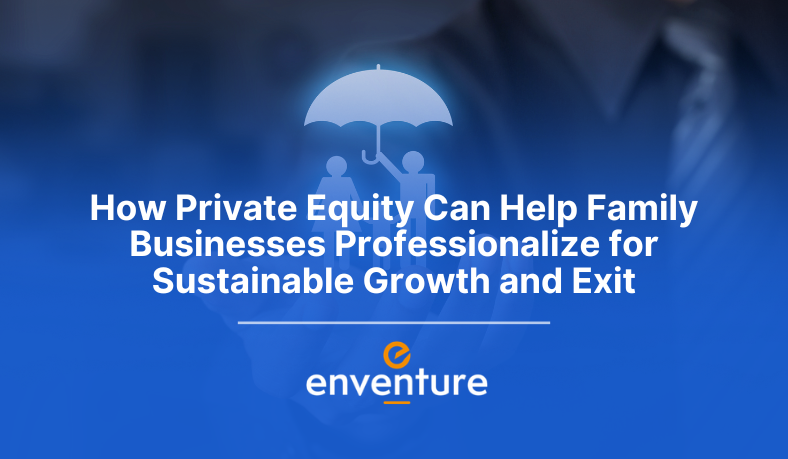Discover how private equity helps family businesses professionalize operations, enhance governance, and prepare for a successful exit—without compromising on legacy. businesses professionalize operations, enhance governance, and prepare for a successful exit—without compromising on legacy.

By Ankit Shrivastava, Managing Partner, Enventure
Family businesses form the backbone of many economies—built on legacy, trust, and close-knit values. But as they grow, many face a difficult challenge: how to maintain momentum, scale sustainably, and eventually transition ownership without losing their essence. This is where private equity (PE) can play a transformative role.
At Enventure, we focus on helping family-owned businesses not just prepare for a profitable exit, but also adopt the tools and practices needed to professionalize and thrive in the long term.
The Common Challenges Family Businesses Face
Family businesses often encounter one or more of the following roadblocks as they scale:
- Lack of formal governance
- Concentration of decision-making power
- Ambiguity around succession planning
- Resistance to external leadership
- Informal systems and controls
These challenges, while understandable, can limit growth and reduce attractiveness to potential buyers or investors.
Where Private Equity Adds Value
Contrary to the misconception that PE only brings capital and control, modern private equity firms—especially those aligned with founder and family values—bring a toolkit of professionalization strategies that enable transformation while respecting legacy.
1. Professional Management
PE firms often help recruit or enhance leadership teams by introducing experienced professionals into key roles. This doesn’t mean pushing founders aside, but rather augmenting capabilities to support scale and innovation.
2. Robust Governance Structures
Through clearer decision-making processes, board structures, and reporting mechanisms, family businesses gain a stronger framework for accountability and performance tracking.
3. Succession Planning
For many family-owned firms, succession is either a taboo or unresolved issue. PE partners help structure ownership transitions, plan leadership succession, and ensure continuity without disrupting day-to-day operations.
4. Operational Efficiencies
Private equity firms bring strategic expertise in optimizing cost structures, streamlining supply chains, and upgrading technology platforms. These efficiencies directly impact EBITDA and enterprise value.
5. Exit Readiness
An exit isn’t just a transaction—it’s a process. PE partners help align short-term goals with long-term value creation, ensuring the business is well-prepared for a strategic sale, IPO, or secondary buyout when the time is right.
Preserving the Soul, Scaling the Business
A key concern for many families is losing the cultural identity of the business. The right PE partner doesn’t override it—they enhance it by ensuring the business is well-positioned to continue the founder’s mission, but at scale and with sustainability.
Private equity is not just for distressed companies or hyper-growth tech firms. For family businesses looking to evolve, a strategic PE partnership offers a unique opportunity to institutionalize operations, unlock value, and create a clear path to a successful exit—without compromising on legacy.
At Enventure, we specialize in working with family businesses that are at an inflection point—ready to scale, evolve, and eventually transition with dignity and impact.
About Author
Ankit Shrivastava is the Managing Partner at Enventure, where he leads investment and strategic advisory across the U.S. and India. His work bridges global innovation in healthcare, space, and sustainability through data-driven decision-making and long-term partnerships.
Bold Moves,
Brighter Futures
Let's team up and make a difference.
Subscribe to our newsletter
Enventure is an exit-driven fund with high-yield opportunities in the healthcare, space, and green tech sectors across the US and India.
Mail Us
3103 Kewanee Ln,
Naperville, IL, 60564
Copyright © 2025 Enventure, all rights reserved.
